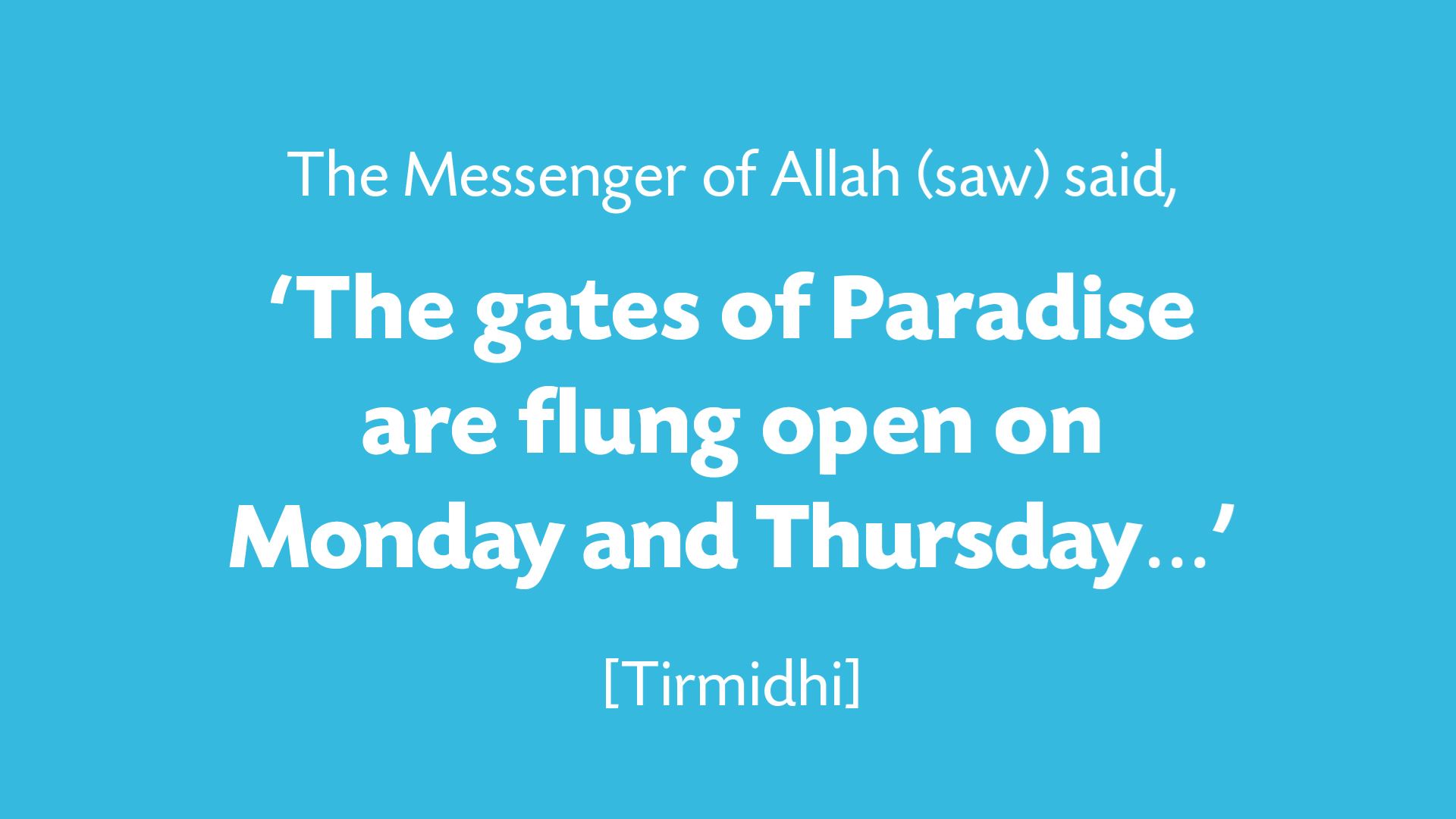
Introduction
Fasting is an important aspect of Islamic practice, with various virtues associated with it. One of the recommended forms of fasting is on Mondays and Thursdays. This sunnah fast has been encouraged by Prophet Muhammad (peace and blessings of Allah be upon him) and has specific benefits attached to it.
Importance and significance of fasting on Mondays and Thursdays
Prophet Muhammad (peace and blessings of Allah be upon him) encouraged Muslims to fast on Mondays and Thursdays as a voluntary act of worship. He himself used to fast on these days, and it is said that he preferred his deeds to be presented to God on Mondays and Thursdays. Therefore, observing this sunnah fast is not only pleasing to Allah but also a way to emulate the Prophet's actions.
Furthermore, fasting on these days holds particular significance in Islamic tradition. According to a narration by Abu Qatadah al-Ansari, the Prophet was asked about fasting on Mondays, to which he replied that it was the day on which he was born and received revelation. Hence, fasting on Mondays holds great spiritual significance.
Similarly, Thursdays are considered significant because it was on this day that the Prophet completed his migration (hijrah) from Mecca to Medina. The act of observing fasting on these days not only serves as a form of worship but also reflects the adherence to the Prophetic tradition.
Benefits of fasting
Fasting on Mondays and Thursdays has numerous benefits, both in this world and the hereafter. Some of these benefits include:
- Increased reward: Fasting on Mondays and Thursdays is a voluntary act of worship, which can lead to increased reward from Allah.
- Improved health: Fasting has numerous health benefits, including detoxification and improved digestion.
- Control over desires: Fasting allows individuals to train themselves to abstain from their desires, which helps in spiritual growth and self-discipline.
- Forgiveness of sins: Fasting has the potential to expiate sins, and this is especially true for voluntary fasts like Mondays and Thursdays.
In conclusion, fasting on Mondays and Thursdays holds great spiritual significance and has numerous benefits. Muslims are encouraged to observe this sunnah fast, not only because it is pleasing to Allah but also because it reflects the adherence to the Prophetic tradition. [1][2][3][4]
What is Dua?
Meaning of Dua in Islam
Dua is an Arabic term that refers to supplication or asking for something. In the Islamic context, dua is the act of asking Allah for help, guidance, forgiveness, and blessings. Muslims believe that dua is a powerful tool that can bring them closer to Allah and grant them their wishes.
The purpose of making Dua
The purpose of making dua is to seek Allah's help and guidance in all aspects of life. Muslims are encouraged to make dua in times of hardship, distress, and need. Dua is also an act of worship and a way to show one's submission and gratitude to Allah. Through dua, Muslims express their faith in Allah and seek His mercy, blessings, and forgiveness.
There are numerous duas mentioned in the Quran and the Hadith, and Muslims are encouraged to learn and recite them regularly. Dua can be made in any language, as long as it is sincere and from the heart. Muslims begin and end their fasts during the month of Ramadan by reciting specific duas, such as those mentioned in this article.
In conclusion, dua is an integral part of Islamic practice and holds great significance in the life of a Muslim. Muslims are encouraged to make dua regularly, and fasting is a great time to increase one's supplications and seek Allah's blessings and forgiveness. [5][6][7][8]
Dhahaba al-zama'u, wa'btallat al-'urooqu, wa thabata al-ajru insha'Allah
Transliteration and Meaning of the Dua for breaking your fast
One of the most common duas recited by Muslims when breaking their fast during the month of Ramadan is "Dhahaba al-zama'u, wa'btallat al-'urooqu, wa thabata al-ajru insha'Allah." The transliteration of this dua is "Thirst has gone, the veins have been moistened, and the reward is confirmed, if Allah wills." This dua expresses gratitude to Allah for the blessings of the food and drink that we are about to consume and seeks His forgiveness for any shortcomings we may have during our fast.
How to recite the Dua
It is recommended to recite this dua just before breaking the fast with a date or some water. The dua can be recited in Arabic or translated into one's native language. To recite the dua in Arabic, follow these steps:
- Raise your hands to your ears and say "Allahumma inni laka sumtu wa bika aamantu wa 'ala rizq-ika aftarthu" which means "O Allah! I fasted for You and I believe in You and I break my fast with Your sustenance."
- Eat a date or take a sip of water.
- Recite the dua "Dhahaba al-zama'u, wa'btallat al-'urooqu, wa thabata al-ajru insha'Allah" three times.
- Make any additional personal duas or supplications.
- End with saying "Allahumma taqabbal minni innaka antas-sami'ul-'alim" which means "O Allah! Accept from me, for You are the All-Hearing, the All-Knowing."
In conclusion, reciting this dua is a beautiful and essential part of the spiritual experience of breaking the fast in Ramadan. It reminds Muslims to express gratitude and seek forgiveness from Allah for the blessings of food and drink that we often take for granted in our daily lives. [9][10][11][12]

The Intention for Fasting
Significance of making the intention
In Islam, making the intention before starting any act of worship is of great significance. The intention is a way of reminding oneself about the purpose and objective of the deed and seeking the pleasure of Allah. Similarly, prior to fasting, it is important to make an intention to remind oneself about the obligation of fasting and dedicating it to Allah.
How to make the intention for fasting on Mondays and Thursdays
If a person intends to fast on Mondays and Thursdays with an uncertain intention (niyyah) – that if they owe any outstanding fast from Ramadan then these days are to make up for them, and if they do not owe any outstanding fast, then these would be naafil (supererogatory) fasts. This intention is comparable to one who intends to fast Ramadan with an uncertain intention that if tomorrow is Ramadan, then it is their obligatory fast.
The purpose of fasting is to come closer to Allah, and making the intention is a way of reaffirming this goal. To make the intention for fasting, one should explicitly state their intention to fast and the reason behind it. For example, if fasting on Mondays and Thursdays, one can state that they are fasting to seek the pleasure of Allah and to follow the Sunnah of Prophet Muhammad (peace be upon him).
In conclusion, making the intention before fasting is essential to remind oneself about the purpose and objective of the act of worship. When fasting on Mondays and Thursdays, one should have a clear intention to dedicate the fast to Allah and follow the example of the Prophet Muhammad (peace be upon him). [13][14][15][16]

Fasting on Mondays and Thursdays
Meaning and purpose of fasting
Fasting is one of the five pillars of Islam, and it is obligatory for all adult Muslims to fast during the month of Ramadan. It is a way of purifying the soul, developing self-discipline, and becoming closer to Allah. Fasting involves abstaining from food, drink, and other physical needs from dawn till dusk. However, Muslims can also choose to fast on other days of the week as well, such as Mondays and Thursdays.
The significance of fasting on Mondays and Thursdays
Prophet Muhammad (peace be upon him) used to fast on Mondays and Thursdays, and he recommended this practice to his followers. Fasting on these days has several benefits, such as:
- It is a way of following the Sunnah of the Prophet and gaining rewards.
- It helps a person develop self-discipline and control over their desires.
- It is a way of purifying the body and soul.
- It can improve overall health and well-being.
In addition, fasting on Mondays and Thursdays has a cumulative effect. If a person fasts on these two days every week, they will have fasted for eight days per month. This equals to fasting on the ayyam al-beed, which are the days on which the moon is full, namely the 13th, 14th, and 15th of each lunar month.
To make the intention for fasting on Mondays and Thursdays, a person should state their intention explicitly, such as fasting to seek Allah's pleasure and to follow the Sunnah of the Prophet. By doing so, they remind themselves of the purpose and objective of the act of worship and increase their connection with Allah. [17][18][19][20]


